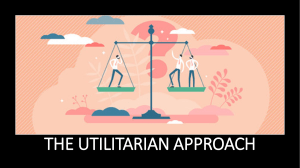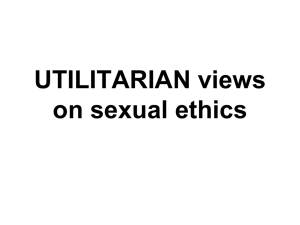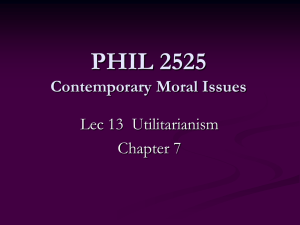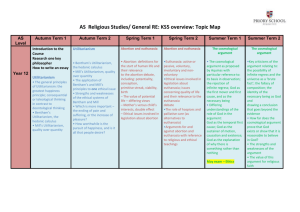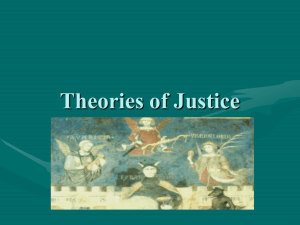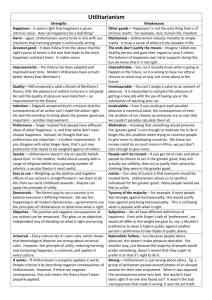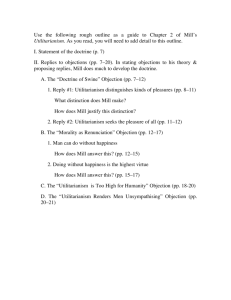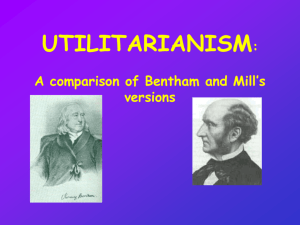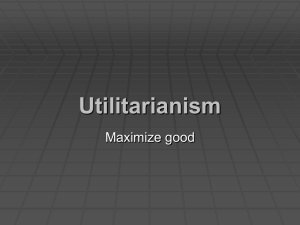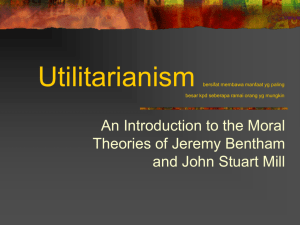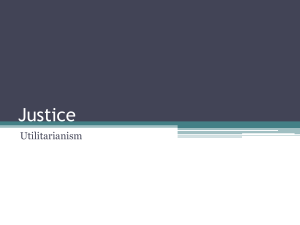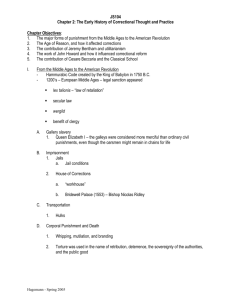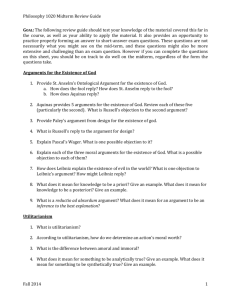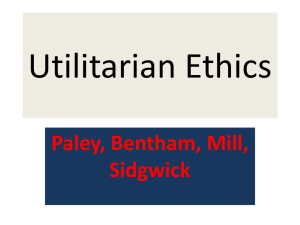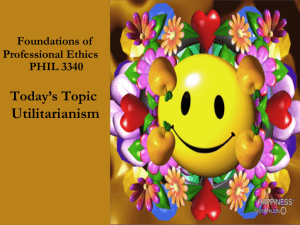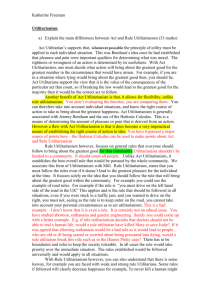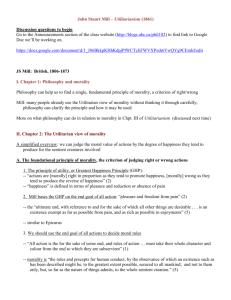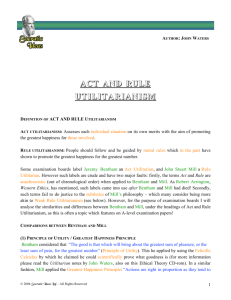Note Taking Assignment Due Date: 1:10 PM on Thursday
advertisement
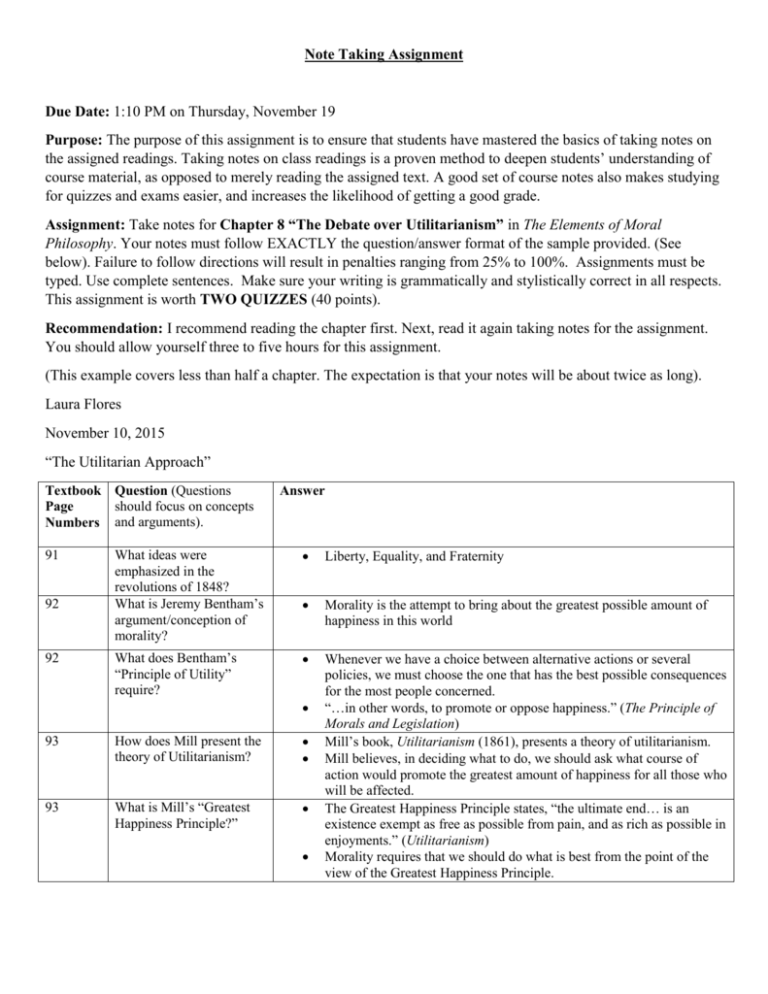
Note Taking Assignment Due Date: 1:10 PM on Thursday, November 19 Purpose: The purpose of this assignment is to ensure that students have mastered the basics of taking notes on the assigned readings. Taking notes on class readings is a proven method to deepen students’ understanding of course material, as opposed to merely reading the assigned text. A good set of course notes also makes studying for quizzes and exams easier, and increases the likelihood of getting a good grade. Assignment: Take notes for Chapter 8 “The Debate over Utilitarianism” in The Elements of Moral Philosophy. Your notes must follow EXACTLY the question/answer format of the sample provided. (See below). Failure to follow directions will result in penalties ranging from 25% to 100%. Assignments must be typed. Use complete sentences. Make sure your writing is grammatically and stylistically correct in all respects. This assignment is worth TWO QUIZZES (40 points). Recommendation: I recommend reading the chapter first. Next, read it again taking notes for the assignment. You should allow yourself three to five hours for this assignment. (This example covers less than half a chapter. The expectation is that your notes will be about twice as long). Laura Flores November 10, 2015 “The Utilitarian Approach” Textbook Question (Questions should focus on concepts Page Numbers and arguments). 91 92 92 Answer What ideas were emphasized in the revolutions of 1848? What is Jeremy Bentham’s argument/conception of morality? Liberty, Equality, and Fraternity Morality is the attempt to bring about the greatest possible amount of happiness in this world What does Bentham’s “Principle of Utility” require? Whenever we have a choice between alternative actions or several policies, we must choose the one that has the best possible consequences for the most people concerned. “…in other words, to promote or oppose happiness.” (The Principle of Morals and Legislation) Mill’s book, Utilitarianism (1861), presents a theory of utilitarianism. Mill believes, in deciding what to do, we should ask what course of action would promote the greatest amount of happiness for all those who will be affected. The Greatest Happiness Principle states, “the ultimate end… is an existence exempt as free as possible from pain, and as rich as possible in enjoyments.” (Utilitarianism) Morality requires that we should do what is best from the point of the view of the Greatest Happiness Principle. 93 How does Mill present the theory of Utilitarianism? 93 What is Mill’s “Greatest Happiness Principle?” 93 Why does the author think Bentham and Mill’s ideas were so radical? Utilitarianism leaves God out of the picture. In Utilitarianism, morality is no longer understood as a code given by a set religion or a series of inflexible rules. 94 What does the dominant moral tradition in our society, Christianity, hold true about death? Christianity holds that human life is a gift from God, so only God may decide when it will end. Initially, all killing was prohibited, but killing for capital punishment and war were permitted later. The main rule is this: the killing of innocent people is always wrong. Utilitarianism would give us the option to consider the choices available to Donnelly (immediate death, remaining in a sickened state, suffering), and then evaluate which of those choices would bring about the best consequences for those involved. A Utilitarian might argue that euthanasia brought about the most happiness for Donnelly because he was no longer in agonizing pain, and thus it was required, or at least okay, to kill him. 95 How would a Utilitarian approach the killing/euthanasia of Harold Donnelly? 95 96 What qualities does Utilitarianism share with Christianity, on Bentham’s account? What does Bentham think the purpose of the law is? 96 Why does Mill argue euthanasia laws are unjustifiable? What did you find most interesting about this reading? Bentham suggests that religion would endorse Utilitarianism based on the church’s conception of a benevolent creator. “…the Being, who is the object of religion, universally supposed to be as benevolent as he is supposed to be wise and powerful…” The purpose of the law is the same as that of morals. It should promote the general welfare of all citizens. Bentham thought the law should not restrict the freedom of citizens any more than necessary. He believed no activities should be prohibited unless, in engaging in that activity, one is doing harm to others. Laws prohibiting euthanasia are contrary to the general welfare, and they are unjustifiable because they place restrictions of people’s rights to control their own lives. In the case of Mr. Donnelley’s euthanasia, no harm was caused to anyone else I enjoy reading about applied ethical principles, so the euthanasia case was the most interesting to me. I would have liked to read some arguments from the other side, however. It was mentioned that most (60%) American terminally ill patients believe euthanasia or physician assisted suicide should be available upon request, and I would like for Rachels to expand upon why he included that statistic, and how that specific population might not be a good representation of the general population.
